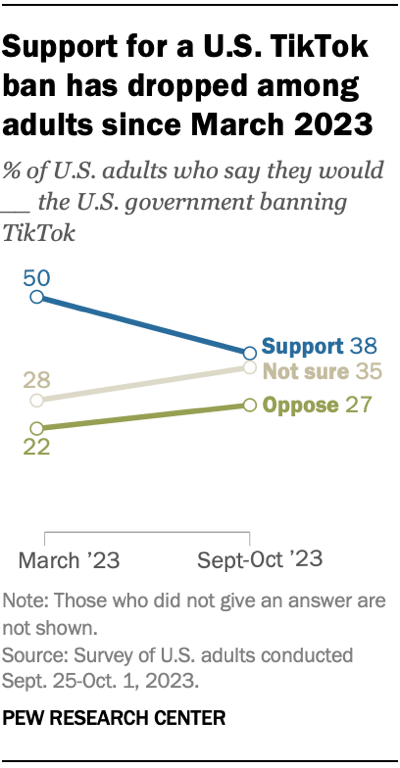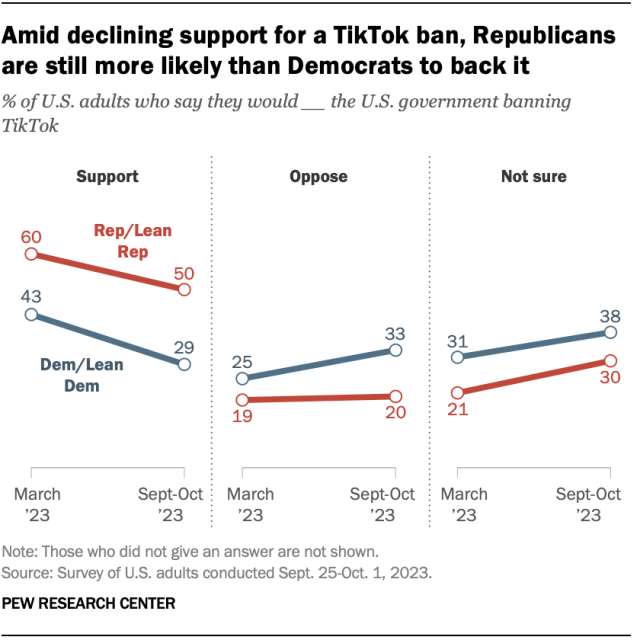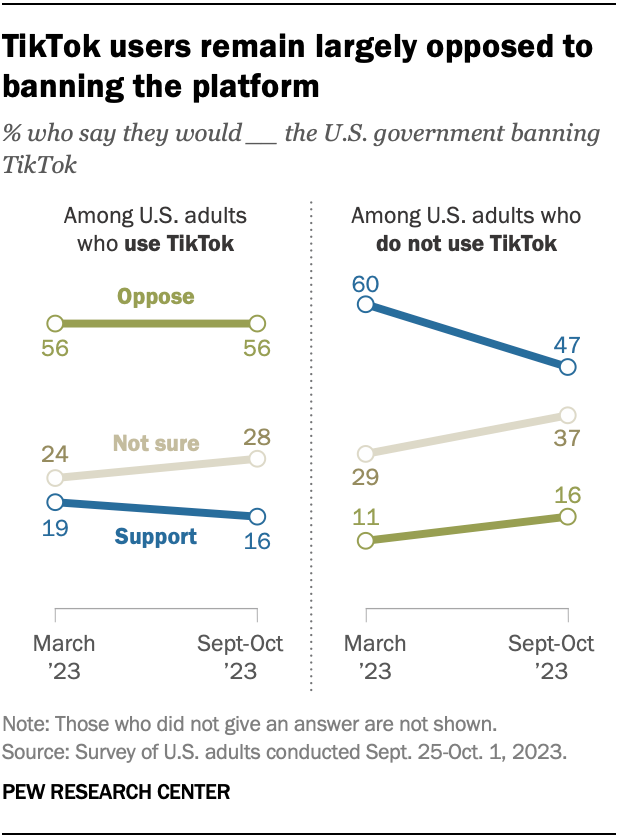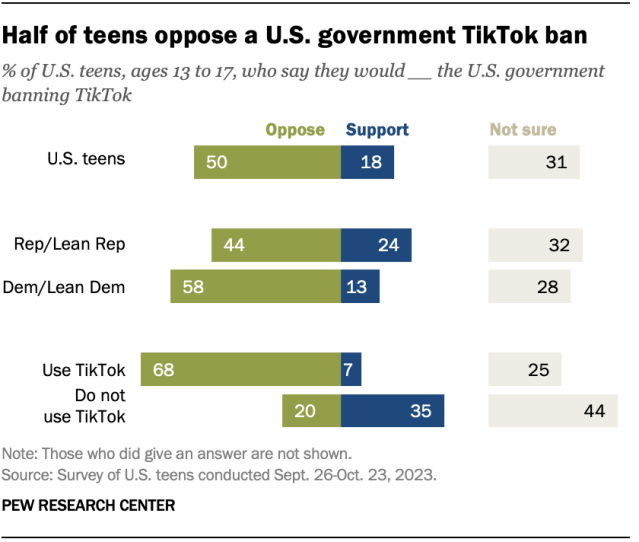The share of U.S. adults who say they would support the U.S. government banning TikTok has declined from 50% in March to 38% now, according to a Pew Research Center survey conducted this fall. And more are opposed to or uncertain about a potential ban today than earlier this year.

Some lawmakers have recently renewed calls to ban the app after initial momentum stalled in Congress earlier this year. And the potential impact on teens has become part of this debate.
So we also asked U.S. teens ages 13 to 17 about a potential TikTok ban in a separate survey this fall. We found that few teens (18%) support the government banning it.
Pew Research Center conducted this study to understand how American adults and teens would feel about the U.S. government banning TikTok. This analysis uses data from two separate surveys, allowing us to compare the views of U.S. teens ages 13 to 17 with those of U.S. adults.
For the analysis of teens, the Center conducted an online survey of 1,453 U.S. teens from Sept. 26 to Oct. 23, 2023, via Ipsos. Ipsos recruited the teens via their parents who were a part of its KnowledgePanel, a probability-based web panel recruited primarily through national, random sampling of residential addresses. The survey is weighted to be representative of U.S. teens ages 13 to 17 who live with parents by age, gender, race and ethnicity, household income and other categories. This research was reviewed and approved by an external institutional review board, Advarra, an independent committee of experts specializing in helping to protect the rights of research participants.
For the separate analysis of adults, the Center surveyed 8,842 U.S. adults from Sept. 25 to Oct. 1, 2023. Everyone who took part in the survey is a member of the Center’s American Trends Panel (ATP). This online survey panel is recruited through national, random sampling of residential addresses. This way nearly all U.S. adults have a chance of selection. The survey is weighted to be representative of the U.S. adult population by gender, race and ethnicity, partisan affiliation, education and other categories. Read more about the ATP’s methodology.
Here are the questions used for this analysis, along with responses, and its methodology.
Adults’ views by political party

While support for a TikTok ban has declined among adults in both parties, Republicans and Republican-leaning independents remain far more likely than Democrats and Democratic leaners to support it (50% vs. 29%).
For Democrats, the balance of views has changed since March. They were more likely to support than oppose a ban then, but their views are now more mixed. Today, 33% are opposed, 29% are supportive and 38% are not sure.
Republicans are still more likely to support than oppose a ban, but that support has fallen by 10 percentage points since March.
Adults’ views by age
Adults under age 30 stand out as the least likely to support a ban. In fact, like in March they are the only age group where opposition outweighs support: Today 41% oppose a ban, 29% support it and 30% are unsure.
Views among these youngest adults are unchanged from March – their support for a ban was muted to start with and remains so. In contrast, support among older age groups has declined:
- 36% of those ages 30 to 49 now support a ban, down from 45% in March
- 39% of those ages 50 to 64 support it, down from 54%
- 49% of those 65 and older support it, down from 71%
Our prior work also shows age differences in TikTok use itself, with adults under 30 far more likely than older Americans to use it.
Adults’ views by use of TikTok

And as was the case earlier this year, views differ based on whether people use the app. The majority of TikTok users (56%) oppose a ban, and a far smaller share (16%) support it. The opposite is true among those who don’t use the platform: 16% oppose a ban and 47% support it.
While the views of TikTok users haven’t changed since March, we do see some change among non-users. Support for a ban among non-users has dropped by 13 percentage points, while uncertainty and opposition have ticked up.
Adults’ views by knowledge of where TikTok’s parent company is based
Lawmakers who argue TikTok is a threat and should be banned often cite its parent company’s ties to China.
But among the public, people who know about this tie have become less supportive of a ban. In March, 60% of those who knew ByteDance is based in China said they would support the U.S. government banning TikTok. By contrast, 43% of those who know about that connection in the new survey would support a ban.
U.S. teens’ views of a TikTok ban

Many teens are on TikTok, including some who use the app “almost constantly.” Overall, teens largely dislike the idea of the U.S. government banning the platform: Half say they would oppose this, far higher than the 18% who would support it. Another 31% are unsure.
This makes teens much less supportive of a ban than adults. Even compared with their closest peers in age, teens are less likely than adults ages 18 to 29 to support a ban (18% vs. 29%).
Teens’ views by use of TikTok
Teens’ attitudes vary along some of the same lines as adults’. For example, teens’ views are dramatically different depending on whether they use the platform:
- Teen TikTok users are far more likely to oppose than support a ban (68% vs. 7%). A quarter are unsure.
- Among teens who don’t use TikTok, more are supportive than opposed (35% vs. 20%). However, the largest share (44%) are unsure.
Teens’ views by political party
Opposition to a ban far outweighs support regardless of which political party teens identify with or lean toward. However, Democratic teens are more likely than their Republican counterparts to say they would oppose the government taking this action (58% vs. 44%).
Note: Here are the questions used for this analysis, along with responses, and its methodology.
